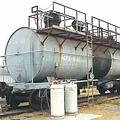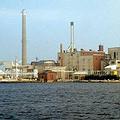 美國國土安全部(Department of Homeland Security)2日發布國會一項新規定,為了預防恐怖攻擊,史無前例地要求具高度危險的化學廠遵守聯邦安全條例。這項規定得到化學製品公司的同意,然而批評者擔憂,在有毒化學物質的運輸管道中,鐵路運輸並未納入其中。
美國國土安全部(Department of Homeland Security)2日發布國會一項新規定,為了預防恐怖攻擊,史無前例地要求具高度危險的化學廠遵守聯邦安全條例。這項規定得到化學製品公司的同意,然而批評者擔憂,在有毒化學物質的運輸管道中,鐵路運輸並未納入其中。
此一規定建立了以風險為評估基礎的標準,並且要求儲有大量化學物質的化學廠做一篩選的評估,裁定其危險等級以及鑑定其安全性。
國土安全部表示,美國境內半數、實際數量約7千處化學廠,對於恐怖攻擊或是意外事件方面都可能具有高度危險性。國土安全部將開始進行化學廠的檢驗與審查,時間點就在這個夏天,首先將針對300-400處被認為是風險最高的化學廠進行查核。
若化學廠中即使是儲有極少量的一氧化碳、氰化氫及甲基溴等化學物質,都必須進行化學廠的篩選評估。在國土安全部發布的規定中,列表具體說明重要化學物質種類,參見連結「Chemicals of Interest」。
 For the first time, high risk chemical facilities will have to abide by federal security regulations to safeguard against terrorist attacks, according to a rule issued Monday by the Department of Homeland Security, as required by Congress. The rule meets with the approval of chemical companies, but critics worry that rail transport of hazardous chemicals is not covered.
For the first time, high risk chemical facilities will have to abide by federal security regulations to safeguard against terrorist attacks, according to a rule issued Monday by the Department of Homeland Security, as required by Congress. The rule meets with the approval of chemical companies, but critics worry that rail transport of hazardous chemicals is not covered.
The rule establishes risk-based performance standards and requires chemical facilities housing quantities of specified chemicals to complete a screening assessment that determines their level of risk and identify security vulnerabilities.
About half of U.S. chemical plants, about 7,000 facilities, are thought to be at high risk of either a terrorist attack or an accident, the department said. This summer, the department will begin conducting site inspections and audits, focusing first on the 300 to 400 facilities considered to be of the highest concern.
If a company has even the smallest amount of some chemicals, such as carbon monoxide, hydrogen cyanide and methyl bromide, on-site, it must do a screening assessment. The list of "Chemicals of Interest" specified under the rule is online here.





